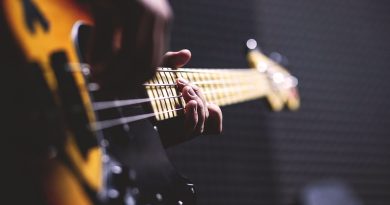Unlock Your Musical Potential: A Beginner’s Guide to Ear Training for Guitarists
Unlock Your Musical Potential: A Beginner’s Guide to Ear Training for Guitarists
As a guitarist, developing your ear is one of the most important skills you can cultivate. Ear training allows you to recognize and replicate melodies, chords, and rhythms by simply listening to music. This ability not only enhances your overall musicianship but also helps you become a more versatile and expressive player. In this guide, we will explore the benefits of ear training for guitarists and provide practical tips and exercises to help you unlock your musical potential.
Why is Ear Training Important for Guitarists?
Ear training is essential for guitarists because it allows you to play music by ear, improvise freely, and communicate with other musicians effectively. By developing your ear, you will be able to:
1. Play by ear: Ear training enables you to listen to a piece of music and play it on your guitar without having to rely on sheet music or tablature. This skill is particularly useful in jam sessions, live performances, and songwriting.
2. Improvise confidently: When you have a strong ear, you can create your own solos and riffs on the spot, using your intuition and musical knowledge. Ear training helps you develop a deeper understanding of scales, chords, and progressions, allowing you to improvise with ease.
3. Transcribe songs accurately: By training your ear, you can accurately transcribe songs and learn them by ear. This skill not only helps you expand your repertoire but also enhances your musical memory and listening skills.
4. Communicate with other musicians: When you can hear and identify musical elements such as intervals, chords, and rhythms, you can communicate more effectively with other musicians. Ear training fosters better musical collaboration and improvisation in group settings.
Practical Tips and Exercises for Ear Training
Now that you understand the importance of ear training for guitarists, let’s explore some practical tips and exercises to help you sharpen your listening skills and unlock your musical potential:
1. Listen actively:
– Start by listening to a wide variety of music genres and styles, paying attention to melodies, harmonies, and rhythms.
– Focus on individual instruments and their interactions within a song, identifying different musical elements such as chords, scales, and dynamics.
– Practice active listening by transcribing short melodies or chord progressions by ear, using your guitar to replicate them.
2. Recognize intervals:
– Intervals are the building blocks of melodies and chords, so learning to recognize and replicate them is crucial for ear training.
– Start by familiarizing yourself with the sound of common intervals, such as major thirds, perfect fifths, and minor sevenths.
– Practice singing and playing intervals on your guitar, using a reference pitch to guide your ear.
3. Identify chords:
– Chords are the basis of harmony in music, so being able to identify and play chords by ear is essential for guitarists.
– Start by listening to different chord progressions in songs, trying to identify the quality (major, minor, dominant, etc.) and function of each chord.
– Practice playing chord progressions on your guitar without looking at sheet music or chord diagrams, relying solely on your ear.
4. Transcribe melodies and solos:
– Transcribing melodies and solos from your favorite songs is a great way to improve your ear and musical memory.
– Start by listening to a short passage of music and trying to play it back on your guitar, focusing on pitch, rhythm, and phrasing.
– Use tools such as slow-down software or online transcription resources to help you learn difficult passages more accurately.
5. Play with backing tracks:
– Playing along with backing tracks is a fun and effective way to practice ear training and improvisation.
– Choose backing tracks in different keys and tempos, experimenting with different scales, modes, and techniques.
– Focus on listening to the groove and feel of the music, responding intuitively with your guitar playing.
In conclusion, ear training is a valuable skill for guitarists that can enhance your musicality, creativity, and communication with other musicians. By actively listening, recognizing intervals and chords, transcribing melodies and solos, and playing with backing tracks, you can unlock your musical potential and become a more confident and expressive guitarist. Remember to practice regularly and be patient with yourself as you develop your ear. With dedication and persistence, you can achieve greater musical proficiency and enjoyment in your guitar playing.






